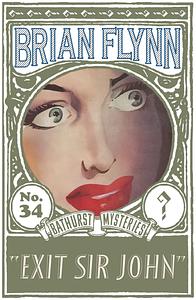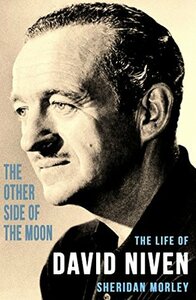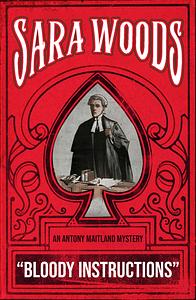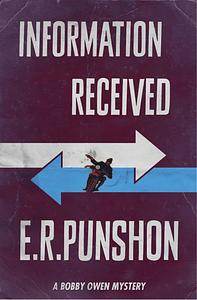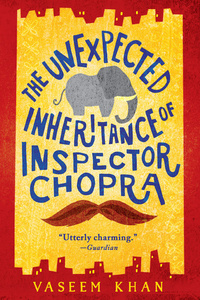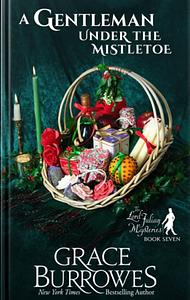Take a photo of a barcode or cover
robinwalter's Reviews (1.87k)
The word "nice" is my favourite example of semantic shift. The earliest recorded uses of the word are pejorative - "dull-witted" "stupid", etc, from its Latin origin, nescius, "ignorant". Over time the word took an interesting journey through various meanings, eventually becoming a vague catchall kind of compliment so bleached and anodyne it is often once again pejorative. If any pedant raises the etymological fallacy with me by insisting words can only mean what they "originally meant", I just smile and say "that's nice."
The point of that introduction is because the word "nice" occurs early on in Malice Domestic and its use illustrates nicely everything that I like about this series. In this passage
Standing alone, his evidence would hang his grandson. What I can’t decide is whether he knows it.”
“Now that,” said his uncle, with some enthusiasm, “is what I call a really nice point.
The word "nice" is there used in what has become a niche meeting, that of "fine" or "subtle", indicating careful attention to detail, something which is a feature of Woods writing - "precise prose" as Curtis Evans describes it in his excellent introduction to the book.
For me her meticulously careful word choice is both a joy to read and appropriate, given that her protagonist is a barrister, someone whose success or failure depends on his skill in choosing exactly the right words, in grasping "the legal niceties". Woods also puts that precise prose to good use in sprinkling dry humour throughout her stories, as in these examples that made me smile
“Well, sir, first I saw Mrs. Cassell, Aunt Agnes, Uncle Gregory’s wife.”
“Is that one person, or three?”
“One, sir. I’m trying to be clear—”
“Then pray continue trying. Heaven defend me from a more obscure statement than you are giving me.”
“There was an uncle.” She sounded doubtful. “But I don’t think he was very mad, only he did like rabbits so much, some people do.
“Peace, perfect peace, with loved ones far away. It would be so odd,” he remarked, gently, “to discover for once the meaning of that eminently sensible remark.”
It helps too that if there's one thing Antony Maitland is not, it's "nice". This is true in more ways than one, because in addition to not being at all ignorant or dull-witted, he often behaves in a manner that would not be described as "nice" in the blandly complimentary sense either. Instead, he often struggles to control his temper at others' "original" niceness, and that sharp temper and absence of 'nice' behaviour was very much a feature of this story. In his defence (ha!) he had plenty of provocation.
The title of the book was very apt, as malice seemed to be the dominant feature of the domestic situation surrounding the murder at the heart of this story. SO MANY people seemed so disproportionately nasty and angry and aggressive in their insistence on letting the accused take the fall that I wondered why. The reason came out in the end, of course, thanks to Antony's patient investigation, with a nice happy ending for all those who deserved one. A solid 4/5
After finishing this second Maitland story, one mystery remains:
In his introduction Evans mentions that some reviewers dubbed Maitland "the Perry Mason of English mystery", but I remember Perry Mason (aka Raymond Burr) as solving his cases via courtroom theatrics and so far, neither of the two Maitland mysteries has even really made it to the courtroom. Will Antony EVER strut his stuff in wig and gown to ensure Justice is served? Clearly I must read more of the series to find out. To do otherwise after the fine work Dean Street Press has done reissuing the series would really not be very
nice.
After finishing this second Maitland story, one mystery remains:
In his introduction Evans mentions that some reviewers dubbed Maitland "the Perry Mason of English mystery", but I remember Perry Mason (aka Raymond Burr) as solving his cases via courtroom theatrics and so far, neither of the two Maitland mysteries has even really made it to the courtroom. Will Antony EVER strut his stuff in wig and gown to ensure Justice is served? Clearly I must read more of the series to find out. To do otherwise after the fine work Dean Street Press has done reissuing the series would really not be very
nice.
lighthearted
mysterious
relaxing
medium-paced
Plot or Character Driven:
Plot
Strong character development:
N/A
Loveable characters:
Complicated
Diverse cast of characters:
Yes
Flaws of characters a main focus:
N/A
"Constable Bobby Owen is less in evidence in this novel than he was in Information Received"
That phrase from Curtis Evans' introduction to Death Among the Sunbathers may be both technically true and somewhat misleading. In the first Bobby Owen story, Information Received, a count on my Kobo Sage tells me the name "Owen" occurs 33 times in the body of the story. In this one, it occurs 200 times. This is very much a Bobby Owen mystery, even if the exact nature of his involvement is somewhat different.
I don't read mysteries with the primary goal of figuring them out, but when I do work out a key element, that's a bonus. So it was for me here, where the surprising use of the word "red" in a very specific context gave me my "Eureka!" moment. Not super early, and definitely not as early as more astute readers would, but well before the point at which even the corpse would have deduced it, so I'm counting that a win.
I read mysteries primarily for entertainment, and I'm scoring this one 4.5/5 because it delivered that in spades. It was fun to read because many passages in the book made it seem likely that Punshon found it fun to write. Here are a few of my favourite examples.
That phrase from Curtis Evans' introduction to Death Among the Sunbathers may be both technically true and somewhat misleading. In the first Bobby Owen story, Information Received, a count on my Kobo Sage tells me the name "Owen" occurs 33 times in the body of the story. In this one, it occurs 200 times. This is very much a Bobby Owen mystery, even if the exact nature of his involvement is somewhat different.
I don't read mysteries with the primary goal of figuring them out, but when I do work out a key element, that's a bonus. So it was for me here, where the surprising use of the word "red" in a very specific context gave me my "Eureka!" moment. Not super early, and definitely not as early as more astute readers would, but well before the point at which even the corpse would have deduced it, so I'm counting that a win.
I read mysteries primarily for entertainment, and I'm scoring this one 4.5/5 because it delivered that in spades. It was fun to read because many passages in the book made it seem likely that Punshon found it fun to write. Here are a few of my favourite examples.
The only visitors had been hopeful artists – tautology, all artists are either hopeful or dead –
Women don’t change their style of doing their hair the way you change your tie, they change it the way you change your religion – weeks of preparation, consultation, debate, hesitation, terror lest your chances in one world or the other will suffer for it.
what the Press says to-day, the public said the day before yesterday. Then the public knows it was right all the time
a chef who really understood the art of cooking – as shown by bad French on a menu, innumerable sauces differing chiefly in name and colour, and a resolute determination that nothing should appear at table resembling itself either in taste or appearance.
Yearningly he wished he were the ideal detective of popular imagination, chiefly engaged on examining the scene of the crime through a large magnifying glass, identifying invisible finger-prints, brilliantly deducing from infallible signs on a burnt match-stick the age, height, name and address, and political opinions of the user.
The actual mystery was surprisingly straightforward in its motive and intent, if complicated and obfuscated by villains not over-endowed with cerebral capacity. Overall, an entertaining and relaxing read, good for a few chuckles and for Bobby Owen's invisible hand everywhere.
medium-paced
Plot or Character Driven:
Plot
Strong character development:
No
Loveable characters:
N/A
Diverse cast of characters:
Complicated
Flaws of characters a main focus:
N/A
One of the things I normally enjoy about reading well-written fiction is learning things the author’s research. The number of interesting snippets of information across a range of subjects I’ve picked up is incalculable. In the case of The Case of the Housekeeper’s Hair, however, what I learned horrified and disgusted me so much it served as a massive distraction from the story.
This book was published in 1948, so when I came across the first mention of German prisoners being bussed to work sites I was thrown for a loop. I went back to check the release date of the book and to confirm that it was set POST-war. Learning that Britain was still keeping hundreds of Germans as prisoners in actual prison camps and using them as slaves/forced prison labour some three years AFTER the war took my already very low opinion of Old Blighted to even lower depths. That none of the characters in the book considered this flagrant breach of the Geneva Convention and indeed basic human rights as in any way remarkable was difficult for me to process and impossible for me to ignore. Reading of searches and police warnings being issued for “escaped prisoners” who by international law should have been repatriated years earlier was stomach-churning. To the victors, the spoils, I guess.
From the point of view of the story, learning of this atrocity made it really hard to concentrate on the actual mystery. Which was a real shame as compared to Jallianwala Bagh, the Tasmanian genocide and too many others to list, it was very small cheese in the history of British butchery and barbarism, and also because the mystery in this story was a very good one. Travers hears someone pledging to commit the perfect murder, sets off to investigate and hopefully prevent it, only for the would-be murderer to end up the murderee. What follows is a really complex, twisty mystery that is well worth a read for anyone who (a) Already knew of the aforementioned British barbarism or (b) Can move past it in a way I could not. Since the travesty of justice in question was not the invention of the author, although its reality was central to the plot, I’m not holding it against the book per se, and am scoring it 4/5
mysterious
sad
tense
medium-paced
Plot or Character Driven:
Character
Strong character development:
Complicated
Loveable characters:
No
Diverse cast of characters:
Complicated
Flaws of characters a main focus:
Yes
I've finished nine other Moray Dalton books, most of them featuring her primary series detective, Inspector Collier. This is not a Collier novel but one of her Hermann Glide series. The Glide stories I'd read before all had Collier in them as well to a greater or lesser extent. This one was all Glide, more or less. I say more or less because he didn't turn up until halfway through the book.
I chose this book as something of an experiment because I was on the fence about the Hermann Glide character and the books in which he features. One of the things that makes it difficult for me to come to a firm opinion about Glide as a detective is how seldom he appears in them - even in those stories in which he is the central detective. In this one, as in the others I've read, he seems to operate more offstage than on, effecting an investigation as a kind of sleuth ex machina.
Happily, that didn't detract from my enjoyment of this book because Dalton writes very well. She describes people well, often with an acerbically droll kind of observation, as in this example
The other was the possessor of the kind of good looks that are often described as Byronic. In other words he was dark and he looked unhappy.
But to me, she especially excels at creating atmosphere. This is very noticeable in some of her other works, especially her non-series works like Death at the Villa. I would put this book right up there in terms of how well she created a sense of place and a sense of mood. This paragraph illustrates that for me:
The Fates, for the most part, work unseen, but there are moments when they can almost be descried, like clouds forming in a sky of storm, brooding, implacable, about to complete some pattern on their tremendous loom.
And indeed this whole book was more about painting a picture of the people and the place, dwelling on the mental and emotional state of the characters and describing their closed-off world, than it was about working out whodunnit. Which is just as well, because the actual culprit was obvious almost from the start and the motive one that I am never comfortable with. The motive is credible enough, but it always feels like a bit of a copout and a touch clichéd.
Despite that niggle, this was, overall, another enjoyable Dalton outing. My internal jury is still out on Hermann Glide, but for making sure that I felt like I was there in that claustrophobically off-kilter community for the entire duration of the story, I'm giving this 4.5/5
mysterious
medium-paced
Plot or Character Driven:
Plot
Strong character development:
No
Loveable characters:
No
Diverse cast of characters:
N/A
Flaws of characters a main focus:
N/A
One of Deborah Crombie's Kincaid and James series of detective novels is built around the persistence and growth of anti-Semitism in the UK during and immediately after World War II. I was reminded of that book by this one. Published in 1947, right from the start of the book it seemed to be so overtly anti-Semitic that I finished it not as a whodunnit but simply to find out if the Jew done it. The creepy fixation on Jewishness comes across as Flynn's fixation, not his characters'. An excellent example being this passage:
Ebenezer Isaacs immediately suggested a tall and much more robust Benjamin Disraeli, one-time Earl of Beaconsfield. He was spare, it is true, but he looked strong and healthy. He was a Jew—there was no doubt about that. His eyes and his nose gave the greatest evidences of that. The eyes were dark-set and restless, and the nose prominent and cast in the mould of Judah.
That passage was also the second time in the book a character had described the UK's only Jewish-born Prime Minister not by that more prominent and famous role, but as the "one-time" and (even more oddly) "some-time" Earl of Beaconsfield. The references were odd and left me with a lingering suspicion that Flynn was not comfortable that one of the UK's most famous C19 statesmen was of Jewish descent, and dismissive of his 'ennoblement'.
As it turned out the evil Jew was a red herring, but by the time that became clear Flynn had angered me even more by breaching what I consider to be a fundamental principle of fair play detective stories. If the detective discovers a clue they consider to be crucial, then the reader of the story should be able to find the same clue and work out its significance. In this story, a critical piece of the puzzle relates to one verse from the Bible, Psalm 135:20. Bathurst reads this verse, but the rendering he uses, which is central to his "Eureka!" moment in unlocking the case, does not exist anywhere. He makes much of the fact that a certain word occurs twice in that verse, when in fact it only occurs once. The fact that the one word in question is closely connected to the "evil Jew" red herring again made me uncomfortable too.
That's lazy research, the ultimate crime for any mystery writer to commit, and really annoying. As someone who's read the entire Bible more often than I could count, it was also a massive distraction, as I chased down multiple English translations , translations in several other languages and checked a Hebrew interlinear version and the Septuagint - all in an ultimately vain hunt for this mythical rendition on which Bathurst built much of his case. I did this not from any concern for religious or doctrinal purity, but simply because I was seriously hacked off that Flynn had made a completely non-existent rendition the key which by Bathurst's own statement unlocked the door to the mystery and let all the pieces fall in place. He might just as well have said, "it's here in the Third Revelation to Zaphod chapter 74, verse 16: "for the Snark was a Boojum, you see!"
This is the 17th Brian Flynn Bathurst novel I have read, and most I have quite enjoyed., some a great deal. This one I am scoring at 2/5 and that's being generous simply because Bathurst's exposition at the end shows that the story could have been interesting were it not for what definitely felt like Flynn's own unhealthy xenophobic fixation on people who "look Jewish" and his decision to cheat me on the one occasion when I thought I could actually play the game on a level playing field.
informative
reflective
medium-paced
When I was a kid, I spent a lot of time at my maternal grandparents' home. They strongly nurtured my love of reading. It was in a small room in their house that I first read The Lord of the Rings as a seven year old. When I wasn't in the spare room falling in love with philology and etymology, I was often in the dining room, watching my grandad reading at the kitchen table. For some reason, whenever I subsequently pictured my grandad sitting at the table reading, the book I saw was "The Moon is a Balloon" by David Niven. So last year I finally got around to reading it myself, and it was entertaining. The stories were fun and he came across as a very interesting man. Finding out after reading it that most of the stories had often only a tangential relationship to something that might in dim light be mistaken for the truth left me feeling a little disappointed.
Which is why I decided to read Sheridan Morley's biography of Niven called "The Other Side of the Moon." I am glad I did, because the overriding impression the book left me with is that Niven's collection of stories was indeed autobiographical — not in spite of being little more than a collection of amusingly enhanced anecdotes but because of it. Morley's book makes it plain that that is who Niven was. The account of Noël Coward and a friend scoring Niven's storytelling after an evening out really drove that home.
Morley's work was very detailed, and something that stood out from it was how often so many different people said almost exactly the same thing about Niven. Comments made decades apart tended to sum up Niven in the same way, as these examples show.
Niven was, in Katharine Hepburn’s intelligent distinction, ‘not so much an actor acting as a personality functioning on camera’
There was an odd sort of insecurity always hanging over him, and he often seemed frightened of wasting his charm on the wrong people – as though it was all he had, and it might one day run out.’
Behind all that bonhomie and the endless anecdotes and good cheer, there seemed to be a sort of nervousness
He wasn’t really an actor: he was a man who presented himself to the world over and over again.’
Morley's book really shone when it touched on the not fun parts of Niven's life, which were numerous and significant, and almost without exception not mentioned at all in his own work. The impact of losing his beloved first wife through a tragic accident, the strains of a career that never completely took off for a combination of reasons, and the description of his final years suffering from motor neuron disease really rounded out the picture of David Niven. Morley writes sympathetically and with compassion.
The only issue I have with the book is its length. It is very clear that the overwhelming bulk of Niven's film career was largely forgettable. Indeed that's almost the point of much of this biography. That being the case, it seems to me the book could have been 50-100 pages shorter had it contained fewer lengthy passages detailing many of those forgettable works. While most of those mediocre to bad films outlined in this biography did contribute something to the picture of Niven the person, there were many that did not, and their absence would not have harmed this book at all. The thrust of almost of all them could be summed up in one comment from an actor about a film they appeared in together:
The picture didn’t really work, but we had a lot of fun.’
Of course, the one thing that it seems Niven liked to do more than anything else was make people laugh, and it's appropriate that there are many passages in this book which do exactly that. One that literally had me laughing out loud also made me think of the title of Niven's follow-up to "The Moon is a Balloon" , "Bring on the Empty Horses" – although in this case it seems the problem was that the horses were anything but empty. In case anyone who reads this decides to read the book (and you should), here's the setup for that very funny anecdote:
My wrangler said, rather ominously, “Don’t get your mount too close to the mares,”
Overall I enjoyed this book for what it taught me about a man who I as a child assumed must've been really famous because of the amount of time my grandfather spent reading his books. Indeed Morley makes clear just how remarkable the success of Niven's raconteur reminiscences really was.
It was also interesting to see something of an insider's perspective on other famous screen names of the era. Such as Peter Sellers, the star of the Pink Panther series of films who this book makes clear was never supposed to be the star of the first Pink Panther movie. The description of that "theft" and its subsequent long lasting effect on Niven is a great example of why this was a very worthwhile read. Thanks again, Dean Street Press!
lighthearted
mysterious
relaxing
Plot or Character Driven:
A mix
Strong character development:
N/A
Loveable characters:
Yes
Diverse cast of characters:
No
Flaws of characters a main focus:
No
Before Dean Street Press announced that they would be publishing the first five of her Antony Maitland series in December 2024, I had never even heard of Sara Woods. Now I can't wait to read more. This was a well constructed mystery, and above all, it was fun to read.
A regular "added value" feature of many Dean Street Press mystery novels are Introductions by the crime historian Curtis Evans. The biographical background of the authors and the historical context of the novels he provides is very helpful. In his introduction to this book he discusses at some length the "Silver Age" mystery writers, the generation of leading crime writers who came up after Christie, Allingham, Marsh, Sayers etc. Two prominent names from that era are PD James and Ruth Rendell. In his introduction Evans cites an example of someone who praised Woods for not writing the sort of bleakly downbeat psychological mysteries those authors specialised in. Rendell and James are not to my taste, so I was encouraged to learn that Woods was not like them. Having finished this book it turns out she was very much not like them.
On the evidence of this first book in the series, the Antony Maitland mysteries are exactly my kind of mysteries. A prominent feature of the story and one that really endeared it to me is the happy and settled domestic life of the protagonist. Series detectives from James and Rendell on have tended to be dour, dyspeptic, depressed and depressing, often with a dash of dysfunctional and divorced thrown in for added alliteration. There is none of that here. The sense of genuine affection between Antony Maitland and his wife Jenny, was not only a joy to read in itself but reminded me of one of my favourite married couples from crime fiction, Albert and Amanda Campion.
Woods did not hold back from including frequent references to the mutual affection between Anthony and Jenny, like this delightfully sentimental passage:
He looked at her more searchingly for a moment, trying to see her as a stranger might, her slim figure silhouetted against the red velvet hangings of the box, and her brown curls shining. Her eyes were probably her best feature: grey eyes, with a quality of steadfastness. For the rest . . . but what a soulless thing was a mere catalogue: she was Jenny, he reflected with a sudden surge of affection, and the most beautiful thing in the world.
and she did not hold back from sprinkling the book with a lot of gentle humour. This example of Antony meeting a potential witness made me chuckle:
“I remember. You came with your father. You were very cheerful.”
Antony, feeling rather as though he had been accused, and convicted, of several of the more lurid Old Testament sins, only just stopped himself in time from apologizing for what had evidently been regarded as a lapse of taste
Some of her humorous observations may have been inspired by her work in a legal office, as with this passage, describing a barrister evaluating potential jurors
there was a stout, motherly body, who obviously had at least ten children, on whom he felt he could rely for sympathetic attention. (The lady in question was single, a professor at London University, and held men in general, and lawyers in particular, in aversion, but that is beside the point.)
It wasn't simply that the book was fun to read that made it enjoyable. Woods wrote well. An example of this that became obvious very early was her ability to create characters that I really did not like. Mystery novels are not generally famous for their characterisation, and it's certainly not the central foundation of her story, but she manages to create characters that come across as real enough for me to actively dislike them. This was especially true of one person described as a friend of Anthony who seemed to me anything but. I was also impressed that for a first novel the recurring characters were introduced with a minimum of exposition. We found out something about all of them, but it's clear that we will find out more about the key characters as the series goes. The absence of info dumps was another big plus.
An interesting feature of this first book in the series was the way that Anthony himself was put in jeopardy. Not physical danger, but his career and reputation was seriously threatened. I'm scoring this book 4.75/5 because I found the aftermath of the resolution a bit unsatisfying. The resolution was probably more realistic than the neat and tidy wrap I’d have preferred, but it still left me some distance from gruntled.
This was my second book for Dean Street December 2024, and the second series debut from a new to me author. I loved both, and since they wrote more than 80 books between them, I have plenty of Dean Street delights to come.
mysterious
reflective
medium-paced
Plot or Character Driven:
Character
Strong character development:
Complicated
Loveable characters:
Complicated
Diverse cast of characters:
No
Flaws of characters a main focus:
Yes
Information Received is the first in E. R. Punshon's Bobby Owen mystery series. The Dean Street Press editions I have bought (of the first four books in the series so far) all make much of the ringing endorsement of Punshon's work by Dorothy Sayers. It is a testament to my regard for Dean Street Press and trust in their judgment that I bought these books despite their being burdened with praise from an author I actively dislike. Happily, this first book in the series rose above that potentially crippling handicap and proved to be exceptional. It also proved again the exceptional value Dean Street Press adds to their reissues with the wonderfully informative introductions, this one by a DSP stalwart, crime fiction historian Curtis Evans.
Sayers praised the books for the quality of their writing. The truth of this assessment is obvious throughout Information Received . I highlighted many passages in my copy where the writing just sang to me. Here are a few of my favourites:
That’s the first maxim in my forthcoming book, The Complete Detective and How to Be It, which will be one of the world’s lost masterpieces because I’ll never write it.
Glancing at a pile of cigarette ash and deducing therefrom the age, income, and political opinions of the smoker, was a feat entirely beyond his powers.
(bonus points for sniping at Holmes)
‘Not that I know much about cricket or football or racing,’ he added, as one might say, ‘not that I know much about slums, or sewage, or lice,’
I daresay lunch was one of the things you studied at the ’Varsity – the Assistant Commissioner always squirms when I say “’Varsity” to him, I don’t know why.’
‘To squirm at that word, sir,’ explained Bobby, ‘is one of the more important points of the U-ni-versity curriculum.’
(bonus points for making me think of Unseen Academicals)
Careful attention to word choice did more than reveal the author's skill as a wordsmith. It was central to unravelling the mystery of who committed the first murder. One key phrase of only three words, which when uttered the first time seemed nonsensical, made such perfect sense the next time it occurred that it actually enabled me to figure it out. Since I "solve" whodunnits less often than Halley's Comet is visible from Earth, this was in itself cause to love the book. I did highlight its second occurrence but did not share the quote in case anyone reading this wants to start the book without knowing whodunnit.
It's a mark of how well the book is structured that working out the whodunnit was made easier for me because the why had been discreetly telegraphed earlier. Thus the lengthy confessional exposition at the end of the book contained few surprises. The journey to that point however was interesting and engaging despite the ultimate answers being fairly clear.
I scored this book 4.75/5 because my one slight niggle was that it was a little longer than it needed to be. I recognise that that's a feature of literature in the pre-social media days, and the quality of the writing was so good that the excessive length was only a minor quibble. Nevertheless, since it was the first book in the series and thus introductions of the key recurring characters were necessary, I'm hoping that later books may be at least a touch tighter and tauter. I'll be finding out soon enough as I look forward to reading the second book soon.
emotional
hopeful
lighthearted
mysterious
medium-paced
Plot or Character Driven:
A mix
Strong character development:
Yes
Loveable characters:
Yes
Diverse cast of characters:
Yes
Flaws of characters a main focus:
N/A
An upbeat start to the series, piquing my interest in book 2
hopeful
lighthearted
mysterious
reflective
medium-paced
Plot or Character Driven:
Character
Strong character development:
Yes
Loveable characters:
Yes
Diverse cast of characters:
N/A
Flaws of characters a main focus:
N/A




